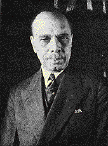| I was intrigued by James Weldon Johnson's Autobiography
of an Ex-Colored Man because of his clever way of portraying
the total stupidity of racism. By using a character whose skin
color is somewhere in-between black and white and can pass for
either, he shows how a person's whole identity can be changed
just as a result of which color people think he is. As a white,
he is perfectly accepted by other whites, but when he - the very
same person - is thought of as black, everyone's attitudes change,
including his own. Publishing the story as an anonymous autobiography
I think was an especially brilliant move. I can't think of any
way a book could show the African-American predicament better
than this. |
||
 James W. Johnson
James W. Johnson
|
It's also a good complement to the political, argumentative writing and speeches of leaders like Booker T. Washington, W.E.B. DuBois, and Johnson himself. It tried to show people that what blacks were arguing for was actually real. Other books just depicting what black life is like attempt to show whites that blacks are normal people; but Autobiography went beyond that to illustrate, without directly accusing, exactly what racism was doing to the race. | |
| Another interesting thing about Johnson is that he's the first black leader we've heard about who doesn't directly fall into one of the two "camps" of Washington or DuBois. Instead, it seems like he had his own political ideology: that the whites were imposing all of the problems on blacks; so the whites should be shown what they're doing in the hope that they'll then want to fix it. He believed that the education problem existed only because the whites didn't give them a chance to be educated, not because the blacks hadn't tried hard enough. He also thought that there were three "classes" of black people: servants and plantation workers, educated ones, and drinkers and trouble-makers. From this, whites were able to justify their racism by pointing out the third group, which was really only a small minority. | ||
| Washington and DuBois, on the other hand, focused on what blacks could do to earn a living and fight for political rights. Johnson was similar to Dubois, nonetheless, in that he wanted full rights, and also he became the first black head of the NAACP, an organization DuBois was associated with (as editor of The Crisis). However, he also worked on a magazine with Washington, who incidentally wrote in his own autobiography about an occurrence he witnessed on a train, where the attendant couldn't figure out which section of the car to put a light-skinned man in. So it seems like politically, Johnson was all over the place, agreeing with others on some points and in other cases coming up with his own ideas. | ||
 Nella Larsen
Nella Larsen
|
Nella Larsen also wrote about African-Americans who could pass for white people, and the situations that brought about. This time, though, she was probably actually writing from her own experience funny because Johnson's supposed Autobiography wasn't real, whereas Larsen's supposed fiction was probably based on her own life! These discrepancies aside, Larsen's writing was about more ordinary things. She wrote about marriages, friends, and social dynamics, things readers probably felt more connected with than a strange man "passing into the white world." So in some ways, her work was possibly more effective than Johnson's. One last thing to note is that many of Larsen's main characters resemble Mrs. Turner from Their Eyes Were Watching God (by Zora Neale Hurston), in their desire to be "more white." | |
| These two authors made a huge contribution to both the literary Harlem Renaissance and to the betterment of the race with their novels. With the theme of "almost-white" African-Americans, they were able to portray the absurdity of racism in a manner not used before. Johnson also provided a new political viewpoint, combining his own beliefs with those of others. It was a viewpoint which said: "There is no reason for African-Americans to be discriminated against! Racism: get over it!" | ||
€ An Elite Group of African-Americans
€ A New Way to Treat Racism
€ Admiring the Differences
€ Unsung Heroes of Black America
€ A Lot of Creative, Inspiring People